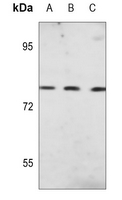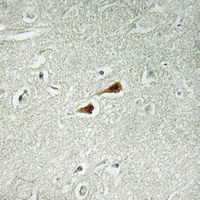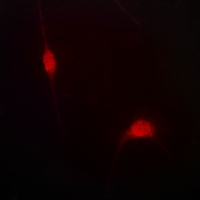Product Name :
JIP1 (Phospho-T103) polyclonal antibody Background :
The JNK-interacting protein (JIP) group of scaffold proteins selectively mediates JNK signaling by aggregating specific components of the MAPK cascade to form a functional JNK signaling module. Required for JNK activation in response to excitotoxic stress. Cytoplasmic MAPK8IP1 causes inhibition of JNK-regulated activity by retaining JNK in the cytoplasm and inhibiting JNK phosphorylation of c-Jun. May also participate in ApoER2-specific reelin signaling. Directly, or indirectly, regulates GLUT2 gene expression and beta-cell function. Appears to have a role in cell signaling in mature and developing nerve terminals. May function as a regulator of vesicle transport, through interactions with the JNK-signaling components and motor proteins. Functions as an anti-apoptotic protein and whose level seems to influence the beta-cell death or survival response. Acts as a scaffold protein that coordinates with SH3RF1 in organizing different components of the JNK pathway, including RAC1 or RAC2, MAP3K11/MLK3 or MAP3K7/TAK1, MAP2K7/MKK7, MAPK8/JNK1 and/or MAPK9/JNK2 into a functional multiprotein complex to ensure the effective activation of the JNK signaling pathway. Regulates the activation of MAPK8/JNK1 and differentiation of CD8+ T-cells. Product :
Liquid in 0.42% Potassium phosphate, 0.87% Sodium chloride, pH 7.3, 30% glycerol, and 0.01% sodium azide. Storage&Stability :
Store at 4°C short term. Aliquot and store at -20°C long term. Avoid freeze-thaw cycles. Specificity :
Recognizes endogenous levels of JIP1 with a phosphorylation site at T103 protein. Immunogen :
KLH-conjugated synthetic peptide encompassing a sequence within the N-term region of human JIP1 with a phosphorylation site at T103. The exact sequence is proprietary. Conjugate :
Unconjugated Modification :
Phosphorylation
JIP1 (Phospho-T103) polyclonal antibody Background :
The JNK-interacting protein (JIP) group of scaffold proteins selectively mediates JNK signaling by aggregating specific components of the MAPK cascade to form a functional JNK signaling module. Required for JNK activation in response to excitotoxic stress. Cytoplasmic MAPK8IP1 causes inhibition of JNK-regulated activity by retaining JNK in the cytoplasm and inhibiting JNK phosphorylation of c-Jun. May also participate in ApoER2-specific reelin signaling. Directly, or indirectly, regulates GLUT2 gene expression and beta-cell function. Appears to have a role in cell signaling in mature and developing nerve terminals. May function as a regulator of vesicle transport, through interactions with the JNK-signaling components and motor proteins. Functions as an anti-apoptotic protein and whose level seems to influence the beta-cell death or survival response. Acts as a scaffold protein that coordinates with SH3RF1 in organizing different components of the JNK pathway, including RAC1 or RAC2, MAP3K11/MLK3 or MAP3K7/TAK1, MAP2K7/MKK7, MAPK8/JNK1 and/or MAPK9/JNK2 into a functional multiprotein complex to ensure the effective activation of the JNK signaling pathway. Regulates the activation of MAPK8/JNK1 and differentiation of CD8+ T-cells. Product :
Liquid in 0.42% Potassium phosphate, 0.87% Sodium chloride, pH 7.3, 30% glycerol, and 0.01% sodium azide. Storage&Stability :
Store at 4°C short term. Aliquot and store at -20°C long term. Avoid freeze-thaw cycles. Specificity :
Recognizes endogenous levels of JIP1 with a phosphorylation site at T103 protein. Immunogen :
KLH-conjugated synthetic peptide encompassing a sequence within the N-term region of human JIP1 with a phosphorylation site at T103. The exact sequence is proprietary. Conjugate :
Unconjugated Modification :
Phosphorylation
-
 Western blot analysis of JIP1 (pT103) expression in mouse brain (A), mouse kidney (B), rat brain (C) whole cell lysates.
Western blot analysis of JIP1 (pT103) expression in mouse brain (A), mouse kidney (B), rat brain (C) whole cell lysates. -
 Immunohistochemical analysis of JIP1 (pT103) staining in human brain formalin fixed paraffin embedded tissue section. The section was pre-treated using heat mediated antigen retrieval with sodium citrate buffer (pH 6.0). The section was then incubated with the antibody at room temperature and detected using an HRP conjugated compact polymer system. DAB was used as the chromogen. The section was then counterstained with haematoxylin and mounted with DPX.
Immunohistochemical analysis of JIP1 (pT103) staining in human brain formalin fixed paraffin embedded tissue section. The section was pre-treated using heat mediated antigen retrieval with sodium citrate buffer (pH 6.0). The section was then incubated with the antibody at room temperature and detected using an HRP conjugated compact polymer system. DAB was used as the chromogen. The section was then counterstained with haematoxylin and mounted with DPX. -
 Immunohistochemical analysis of JIP1 (pT103) staining in human brain formalin fixed paraffin embedded tissue section. The section was pre-treated using heat mediated antigen retrieval with sodium citrate buffer (pH 6.0). The section was then incubated with the antibody at room temperature and detected using an HRP conjugated compact polymer system. DAB was used as the chromogen. The section was then counterstained with haematoxylin and mounted with DPX.
Immunohistochemical analysis of JIP1 (pT103) staining in human brain formalin fixed paraffin embedded tissue section. The section was pre-treated using heat mediated antigen retrieval with sodium citrate buffer (pH 6.0). The section was then incubated with the antibody at room temperature and detected using an HRP conjugated compact polymer system. DAB was used as the chromogen. The section was then counterstained with haematoxylin and mounted with DPX.
Bioworld Biotech only provide peptides for our antibodies and do not provide additional peptide customization services.
Price/Size :
USD 368/1mg/vial
Tips:
For phospho antibody, we provide phospho peptide(0.5mg) and non-phospho peptide(0.5mg).Describe :
Blocking peptides are peptides that bind specifically to the target antibody and block antibody binding. These peptide usually contains the epitope recognized by the antibody. Antibodies bound to the blocking peptide no longer bind to the epitope on the target protein. This mechanism is useful when non-specific binding is an issue, for example, in Western blotting (WB) and Immunohistochemistry (IHC). By comparing the staining from the blocked antibody versus the antibody alone, one can see which staining is specific; Specific binding will be absent from the western blot or IHC performed with the neutralized antibody.Formula:
Synthetic peptide was lyophilized with 100% acetonitrile and is supplied as a powder. Reconstitute with 0.1 ml DI water for a final concentration of 10 mg/ml.The purity is >90%,tested by HPLC and MS.
Storage:
The freeze-dried powder is more stable. For short time at 2-8°C. For long term storage store at -20°C.
Note :
This product is for research use only (RUO only). Not for use in diagnostic or therapeutic procedures.
 JIP1 (Phospho-T103) polyclonal antibody
JIP1 (Phospho-T103) polyclonal antibody  Datasheet
Datasheet COA
COA MSDS
MSDS SHIP
SHIP